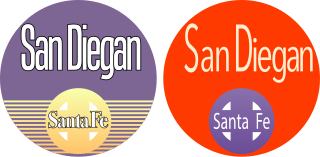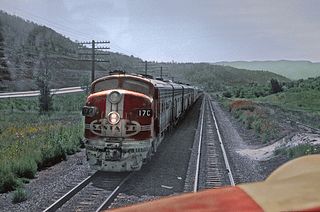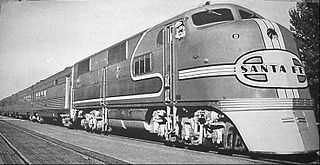
The cuisine of California reflects the diverse culture of California and is influenced largely by Hispanic American roots, alongside East Asian and Oceanian influences, and Western European influences, as well as the food trends and traditions of larger American cuisine.

Alice Louise Waters is an American chef, restaurateur, and author. In 1971, she opened Chez Panisse, a restaurant in Berkeley, California, famous for its role in creating the farm-to-table movement and for pioneering California cuisine.

The Atchison, Topeka and Santa Fe Railway, often referred to as the Santa Fe or AT&SF, was one of the larger railroads in the United States. The railroad was chartered in February 1859 to serve the cities of Atchison and Topeka, Kansas, and Santa Fe, New Mexico. The railroad reached the Kansas–Colorado border in 1873 and Pueblo, Colorado, in 1876. To create a demand for its services, the railroad set up real estate offices and sold farmland from the land grants that it was awarded by Congress.

The Super Chief was one of the named passenger trains and the flagship of the Atchison, Topeka and Santa Fe Railway. The streamliner claimed to be "The Train of the Stars" because of the various celebrities it carried between Chicago, Illinois, and Los Angeles, California.

The San Diegan was one of the named passenger trains of the Atchison, Topeka and Santa Fe Railway, and a “workhorse” of the railroad. Its 126-mile (203-kilometer) route ran from Los Angeles, California south to San Diego. It was assigned train Nos. 70–79.

The El Capitan was a streamlined passenger train operated by the Atchison, Topeka and Santa Fe Railway between Chicago, Illinois, and Los Angeles, California. It operated from 1938 to 1971; Amtrak retained the name until 1973. The El Capitan was the only all-coach or "chair car" to operate on the Santa Fe main line between Chicago and Los Angeles on the same fast schedule as the railroad's premier all-Pullman Super Chief. It was also the first train to receive the pioneering Hi-Level equipment with which it would become synonymous.

The Chief was a long-distance named passenger train of the Atchison, Topeka and Santa Fe Railway that ran between Chicago, Illinois and Los Angeles, California. The Santa Fe initiated the Chief in 1926 to supplement the California Limited. In 1936 the Super Chief was introduced, soon eclipsing the Chief as the standard bearer of the Santa Fe. The Chief was discontinued in 1968 due to high operating costs, competition from airlines, and the loss of Postal Office contracts.

The Fred Harvey Company was the owner of the Harvey House chain of restaurants, hotels and other hospitality industry businesses alongside railroads in the Western United States. It was founded in 1876 by Fred Harvey to cater to the growing number of train passengers.

New Mexican cuisine is the cuisine of the Southwestern US state of New Mexico. The region is primarily known for its fusion of Pueblo Native American cuisine with Hispano Spanish and Mexican cuisine originating in Nuevo México.
The Santa Maria Valley Railroad is a 14.8 miles (23.8 km) shortline railroad that interchanges with the Union Pacific Railroad's Coast Line at Guadalupe, California. As of 2006, the Railroad is owned by the Coast Belle Rail Corporation.

The Golden Gate was one of the named passenger trains of the Atchison, Topeka and Santa Fe Railway. It ran between Oakland and Bakersfield, California; its bus connections provided service between San Francisco and Los Angeles via California's San Joaquin Valley.

Santa Fe Depot in San Diego, California, is a union station built by the Atchison, Topeka and Santa Fe Railway to replace the small Victorian-style structure erected in 1887 for the California Southern Railroad Company. The Spanish Colonial Revival style station is listed on the National Register of Historic Places and is a San Diego Historic Landmark. Its architecture, particularly the signature twin domes, is often echoed in the design of modern buildings in Downtown San Diego.
Cafe Gratitude is a small chain of restaurants serving organic, plant-based (vegan) food, founded by Terces and Matthew Engelhart. In addition to vegan food, honey is served with some options. There are three locations in the Los Angeles area, in Venice, Larchmont Village, and in the Downtown Arts District, and one in San Diego. One location in Santa Cruz is owned by a separate legal entity within the Englehart family, and a separately-owned location exists in Kansas City, Missouri.

The Culinary Revolution was a movement during the late 1960s and 1970s, growing out of the Free Speech Movement, when sociopolitical issues began to profoundly affect the way Americans eat. The Culinary Revolution is often credited to Alice Waters, the owner of Chez Panisse restaurant in Berkeley, California

Sunburst, also known as Brotherhood of the Sun, is an intentional community founded in 1969 by Norman Paulsen in Santa Barbara, California. Sunburst began in the late 1960s, inspired by an idea for self-sustaining World Brotherhood Colonies envisioned by Paramahansa Yogananda, the Indian yogi and author of the 1946 book Autobiography of a Yogi and founder of Self-Realization Fellowship. It was founded and led by Norman Paulsen, one of the direct disciples of Paramahansa Yogananda. Paulsen's doctrine has been defined as a syncretic religion which incorporates alternative spiritual beliefs and ideas brought form ufology, theosophy, esoteric Christianity, Hopi traditions, Kriya yoga, and meditation. Over a span of twenty-five years, Sunburst found its permanent home on the 4,000-acre Sunburst Sanctuary, approximately twenty minutes south of Lompoc, California. Scattered throughout these hills are residences of members who live on the ranch. Norman Paulsen died in 2006. After the founder's death, his widow Patricia Paulsen became the spiritual leader of Sunburst.
Seeds of Change is an organic seed and food company owned by Mars, Inc. Until summer 2010, the company was based in Santa Fe, New Mexico, and producers of a line of processed organic foods including pasta sauces and salad dressings. Seeds of Change was founded in 1989, as a seed company specializing in organics by Gabriel Howearth and Kenny Ausubel. The company devotes 1% of its net sales toward sustainable organic farming initiatives.

Deborah Madison is an American chef, food writer and cooking teacher. She has been called an expert on vegetarian cooking and her gourmet repertoire showcases fresh garden produce. Her work also highlights Slow Food, local foods and farmers' markets.
Food from the 'Hood was a high school-based, student-owned, organically farmed products company that also marketed a line of natural salad dressings. Founded in 1993, the non-profit organization was still in business in 2003, during the 10th anniversary of the Los Angeles riots from which it was born.

The Saturn Cafe is a vegetarian diner in Oakland, California, with former locations in Berkeley, Los Angeles, and Santa Cruz. Its original Santa Cruz location was established in 1979 and closed in 2021; the Los Angeles restaurant opened in 2020. The Santa Cruz location has been variously owned by Don Lane, a husband and wife team, and former employees of the diner. The Berkeley location of Saturn Cafe was open from 2009 to 2018.

















